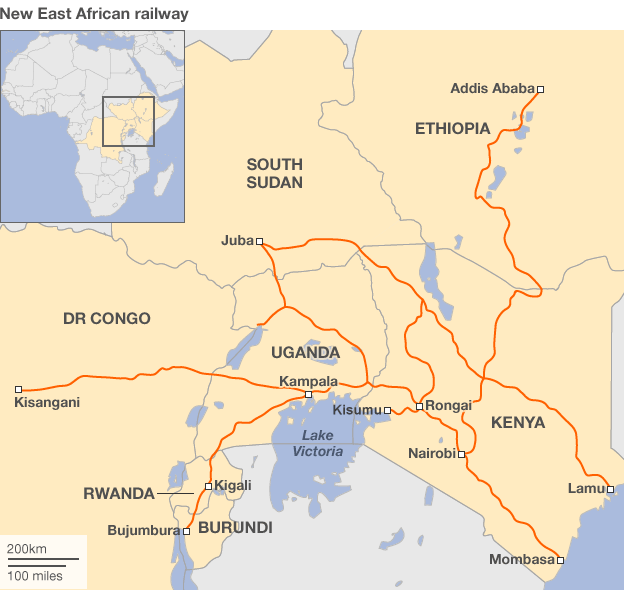East African rail expansion meets growing opposition

Map source:BBC
A Chinese-funded multibillion-dollar standard gauge railway project in East Africa is coming under fire for failing to meet the needs of the local communities it affects. The new network will sharply improve transportation links to key resource-rich areas in the region, helping to open up access to the world’s newest oil and gas discoveries, but local leaders are increasingly pushing the Asian nation to provide more of what local communities want: decent jobs and transparent deal-making.
Once completed, the 2,935-kilometer network is expected to slash freight costs by more than 60%, boost regional trade and provide the first railway link to Uganda’s Lake Albertine Rift basin, believed to contain as much as 6.5 billion barrels of crude oil.
But storm clouds are gathering over the project, with local communities in Uganda and Kenya increasingly questioning the bidding processes and demanding better jobs for local communities.
“Contracts for the projects are shrouded in secrecy, this cannot be good for us as well as future generations” said Geofrey Ekanya, a member of the Ugandan parliament. “The Chinese are giving us cheap loans, but this should also translate into good jobs for our people.”
Chinese Premier Li Keqiang signed the deal for the project with the leaders of Uganda, Kenya, South Sudan and Rwanda in May in the Kenyan capital Nairobi. Although the project is being undertaken by all the countries jointly, each nation has to individually agree financing arrangements for the section of the project in its territory. The agreement gave Chinese companies exclusive rights to lead the project in each of the four nations, according to officials.
The rail network expansion is the largest post-independence infrastructure project in a region that has accounted for 25% of the new oil and gas discoveries worldwide over the past four years. The discoveries have piqued the interest of investors from energy-hungry Asia who are looking to develop facilities to aid the exploitation of newly discovered resources.
The railway project will supplement the existing century-old narrow gauge network that now only runs up to Uganda. The new lines are designed to continue to oil-rich but landlocked South Sudan, Eastern Congo and Rwanda.
According to the East African Community secretariat, the new railway will cut freight costs to 8 U.S. cents a metric ton per kilometer from the current 20 cents. Trains on the new tracks will be able to travel at up to 120 miles per hour.
China Road and Bridge Construction Company (CRBC) started work on the first phase of the project in Kenya last month.
But days after the commencement of the construction, protests erupted in the Kenyan town of Voi, blocking traffic to the only regional highway to the port city of Mombasa for several hours. The protesters, who blocked the highway with burning tires, accused the Chinese contractor of denying them jobs in favor of Chinese expatriates.
The protests subsided after the Chinese company promised to cap the number of expatriate workers to 2,500 out of the total workforce of around 30,000, according to Julius Li, the liaison and cooperation manager for CRBC.
It is not only the Kenyan section that has sparked local resentment. Last week, Uganda’s parliament appointed a panel to probe the contract-awarding process for the Ugandan project.
According to Helen Kawesa, a spokeswoman for the Ugandan parliament, the country’s lawmakers want to review the circumstances under which China Civil Engineering Construction Corp., or CCECC, which had been earlier contracted to build the project, lost the deal to another Chinese company, China Harbour Engineering Company (CHEC). “The probe committee will also look into allegations of cost-inflating and design flaws raised by whistleblowers,” Ms. Kawesa said. CHEC denies the allegations.
The two Chinese companies are currently embroiled in a legal dispute in a Ugandan court over the project, a situation that is out of character for the usually cooperative Chinese entities.
“We had a better project proposal, that’s why we won the contract but our colleagues are not taking this in good faith,” a spokesman for CHEC said. But CCECC accuses CHEC of enlisting the support of “powerful” government lobbyists to scupper its earlier deal.
According to Suzan Kataike, the spokeswoman for Uganda’s works and transport ministry, government negotiations with CHEC over the commercial contract for the project are expected to be completed within the next few weeks, to allow the commencement of the project by early 2015. The entire regional project is expected to be completed by early 2018.
Over the past decade, China has strengthened its economic ties with Africa, mainly in search of minerals and energy sources for its resource-hungry economy. But activists accuse Beijing of using Africa only as a source of natural resources as well as a market for its goods, which could strangle the continent’s development efforts.
Write to Nicholas Bariyo at nicholas.bariyo@wsj.com.
Source: WSJ

